Inclusivity: We can and should do better
I’ve previously highlighted findings by the urbanist Richard Florida that show many of our nation’s creative centers have produced unprecedented but unevenly shared prosperity. We’ve seen such disturbing data about affordability and inclusiveness even in this affluent city. But beyond dry statistics, we have the personal feelings of those who experience economic and social disparity, thanks to a recent report by the city of Boulder in its “Community Perception Assessment of Boulder as a Safe and Inclusive Community.” There is much to digest in this report, not only for civic and political officials, but also for business leaders.
The Community Perception Assessment surveyed residents regarding their perceptions of Boulder as a safe and welcoming community. It was comforting, and maybe not all too surprising, that the report found folks generally feel physically safe and positive about our quality of life. And then there was this finding: “A small but persistent lack of inclusion was reported, particularly by non-majority community members and newcomers. Many reported that these acts did not seem intentional but rather could be attributed to a local lack of exposure to diversity, microaggressions, and unaffordability.”
I often hear from local companies of their sincere efforts to nurture a balanced workforce with a rich mix of personal backgrounds and experiences. That is smart business. No less an authority than the Harvard Business Review recognizes that a diverse workforce “unlocks innovation by creating an environment where ‘outside the box’ ideas are heard” and results in improved market performance. Yet the desire to create a diverse workforce can conflict with a community environment that fails to welcome those with different experiences and backgrounds.
SPONSORED CONTENT
Select your Republic Services residential cart now!
In preparation for Republic Services becoming the primary provider of residential recycling, yard trimmings, and trash, residents should now select the best cart size and service schedule for their household needs.
As both a challenge to our better angels and for sound business reasons, therefore, I applaud the city of Boulder for initiating the Community Perception Assessment and for the steps it now plans to take to create a more welcoming community.
As president and CEO of an organization representing Boulder’s business community, I found a couple of issues in the Community Perception Assessment to be particularly relevant. They also form the basis of a call to action. To the extent that the city survey discussed housing costs and low-price shopping alternatives as the driver of Boulder’s exclusivity, the Boulder Chamber will continue to promote policies to provide more affordable options. But it’s also critical to openly confront the sometimes more-subtle issues of implicit and explicit bias the Community Perception Assessment survey respondents reported, especially as they relate to practices by our business community.
Lack of awareness — Because Boulder does not have a very diverse population base, there is a risk that the majority group doesn’t realize the extent to which discrimination and disparity exist. This is everywhere from the plant floor to the boardroom. To the extent that efforts such as the city survey could help shed more light on the issue, that’s all to the good. But the business community also has an important role to play. That is why, for example, the Boulder Chamber is proud of its collaboration with the Community Foundation in the Leadership Fellows program that places a strong emphasis on inclusive leadership principles and developing a diverse mix of future business and community leaders.
“Explicit” and “implicit” bias — Here the perception is that Boulder is not a truly welcoming community, as exemplified by how non-majority populations are treated by locals. This can assume the character of overtly unequal treatment by businesses to subtle and likely unintentional forms of micro-aggression. Knowing our business leaders as I do, I can’t imagine they would tolerate even inadvertent discriminatory actions by their employees or hiring managers. However, to the extent that perceptions are a strong indication of on the ground reality, then we are compelled to identify and address it — through appropriate education, training and corrective action — making sure all persons are treated fairly and respectfully.
There were a number of other issues the Community Perception Assessment raised that provide important lessons for business interests and opportunities for positive action. Yes, Boulder gets appropriately high marks in the survey report for generally being a welcoming place for all. At a recent YWCA forum I moderated on racism in the workplace, though, I was urged to have the Boulder Chamber take an even stronger leadership role in tackling diversity and inclusivity issues. I view this article as a start, and we won’t let it end here. It’s what’s right for a truly sustainable economy and healthy community and it’s just what’s right.
John Tayer is president and CEO of the Boulder Chamber. Reach him at 303-442-1058 or john.tayer@boulderchamber.com.
I’ve previously highlighted findings by the urbanist Richard Florida that show many of our nation’s creative centers have produced unprecedented but unevenly shared prosperity. We’ve seen such disturbing data about affordability and inclusiveness even in this affluent city. But beyond dry statistics, we have the personal feelings of those who experience economic and social disparity, thanks to a recent report by the city of Boulder in its “Community Perception Assessment of Boulder as a Safe and Inclusive Community.” There is much to digest in this report, not only for civic and political officials, but also for business leaders.…
THIS ARTICLE IS FOR SUBSCRIBERS ONLY
Continue reading for less than $3 per week!
Get a month of award-winning local business news, trends and insights
Access award-winning content today!


